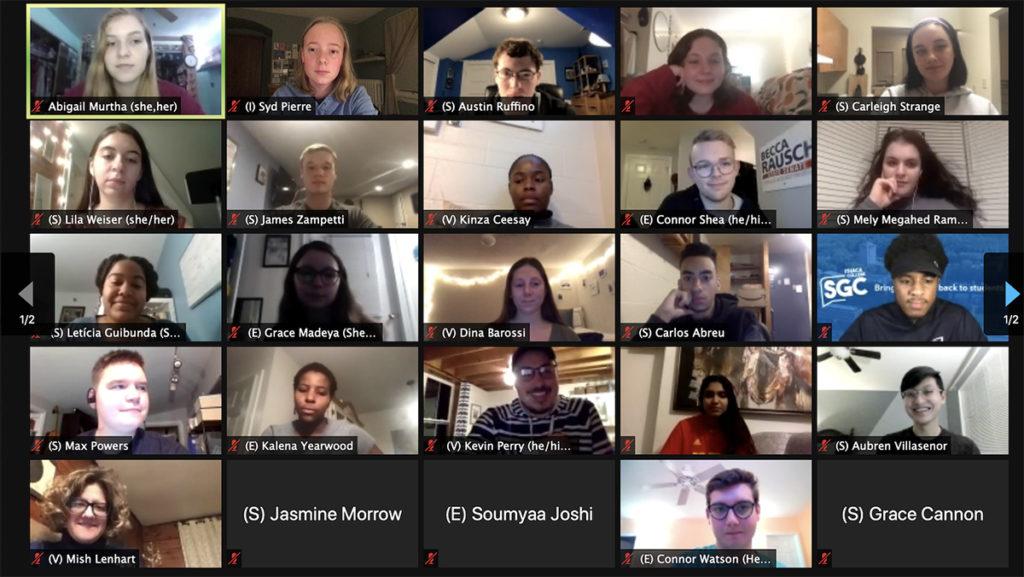The Ithaca College Student Governance Council discussed possible ideas for spring orientation with Kevin Perry, associate director for the Office of New Student and Transition Programs (NSTP), at its Nov. 9 meeting.
The SGC also passed one bill that changed responsibilities for academic senators and tabled a bill that recommended creating dean councils for all five schools. It confirmed two senators — a club athlete senator and a School of Business senator.
Perry spoke about the role of NSTP, an office that runs orientation programs and Family Week, which is currently ongoing from Nov. 6 to 13.
The college recently announced that it will allow more students on campus in the spring because of the change in travel advisories in New York state. Students living on campus will move in throughout January and into early February. Because of the change, Spring Welcome — a program for freshman and transfer students — was pushed back, although the new date has not been finalized.
Senior Connor Shea, president of the SGC, asked how the SGC could help out with Spring Welcome.
“We want to make sure that we are creating a really welcoming and inclusive environment, especially in this virtual environment,” Shea said.
Perry said that NSTP is looking for partnerships across the college between clubs and organizations. He said he wants to partner with the SGC to host and support events.
“Hosting programs is going to have a lot more limitations than ever has before,” Perry said. “We are talking about how many programs do we need to have to be able to host options for students to be engaged, and, similarly, do we have the support staff and the student staff to be able to host and put on those programs?”
Freshman James Zampetti, School of Humanities and Sciences senator, asked Perry what some of the differences between summer and spring orientation would be and how orientation would prepare students to be on campus. Fall orientation was held virtually.
Perry said the proposed plan for orientation would be a monthlong virtual program, but events will be spaced out throughout the month. Perry said feedback about the typical weeklong orientation was that the time frame was challenging for both students and faculty.
The weeklong orientation was first implemented in summer 2019 but received negative feedback because of packed schedules and disorganized events. As a result, orientation was shortened to five days for summer 2020.
He said a few goals would be to have webinars that students would select to join at a time that works best for them, as well as having a two-week period when students could work directly with an adviser.
The SGC also passed one bill and tabled another.
The Academic Policy Committee Requirement Amendment passed 13–0 with three abstentions. The bill recommends that academic senators can serve on any academic committee of their choosing — which must be approved by the vice president of academic affairs — and at least two members of the SGC must be at an Academic Policies Committee (APC) meeting. The APC is in charge of reviewing and improving academic policies and procedures that impact curriculum at the college.
The bill was sponsored by senior Carleigh Strange, School of Music senator, and co-sponsored by sophomore Soumyaa Joshi, vice president of academic affairs for the SGC.
Currently, six members of the SGC — senators who represent the five schools and the vice president of academic affairs — are required to attend the APC meeting. The APC meets as a full committee once a month, while subcommittees meet two to three times a month.
The bill recognizes that not every SGC member is always available to attend and that it would be more beneficial to have academic senators attend other committees, like the Integrative Core Curriculum Task Force and curriculum committees, rather than have six members at one meeting.
The bill amends Article IV, Section 5, Subsection 8 of the SGC Constitution from “academic senators shall serve on Academic Policy Committee” to “academic senators shall serve on one approved academic committee of their choice.”
Currently, the college has nine standing academic committees: Academic Calendar Committee, APC, Academic Program Review, All-College Tenure and Promotion, Committee for College-Wide Requirements, Faculty Grievance Committee, Faculty Personnel Appeals Committee, Graduate Council and Honorary Degree Advisory Committee.
The SGC tabled the Dean’s Student Council Recommendation with a vote of 12–1–2. The bill was sponsored by Strange and co-sponsored by Joshi and Zampetti.
The bill recommends that deans of all five schools create a Dean’s Student Council for every school. Currently, only the School of Music and School of Business have student councils.
The bill states that deans should collaborate with students to better understand student issues within the school and should “listen, acknowledge and value student input on how to improve their school and better meet the needs of students.”
The bill recommends that deans should hold meetings with students at least once a month for a minimum of 50 minutes. It also recommends that there should be at least one representative of every major in the student councils.
The SGC debated the length and language of the bill. A number of SGC members said that they would rather pass the bill at the meeting and forward it to the deans rather than tabling the bill and addressing it later.
Shea said that while he agreed that councils are needed, he was concerned about the brevity of the bill, which was four paragraphs long, given how important the recommendation was.
Senior Agnes Scotti, Class of 2021 senator, recommended adding more specifics like certain numbers of students, to ensure the bill will be accepted by the deans.
Both Joshi and Strange emphasized that the decision to include certain majors and what types of grouping the majors would be in would be left up to the deans of every school. Strange also said she and Joshi left the language of the bill brief and open–ended because every school works differently.
Joshi said she thinks the bill will go over well with the deans and that, ultimately, recommendations in the bill are left up to the deans.
“We are requesting the deans create these meetings and facilitate these meetings,” Joshi said. ”They are going to be the ones that lead these meetings, so I feel like they should have the final say. That’s why we also include language saying academic senators can create a dialogue with the deans to propose or give feedback and recommendations on how to best create these meetings.”
The SGC also confirmed two new senators at its meeting. The SGC now has 19 out of 25 senator positions filled.
Senior Dina Barossi was confirmed to the club athlete senator position with a vote of 15–0.
Barossi ran on a platform that showcased her experience with club sports. Both a member and treasurer of the women’s lacrosse team, she said that she has also worked in the club sports office for three years.
Junior Kinza Ceesay was confirmed for the position of School of Business senator with a vote of 13–0 with two abstentions.
Sophomore Austin Ruffino, senator-at-large, asked Ceesay about possible involvement in the search for a new dean for the business school, a search that has been postponed until October 2021. Ceesay said she would love to be involved in the decision. She emphasized the idea that the new dean would be someone who could advocate for the needs of underrepresented groups in the business school.
“As you know, the usual saying is that business is a man’s world, so underrepresented groups indicate like women, people of color, Black people, individuals in the LGBTQ+ community and other people of color,” Ceesay said. “So I would push for looking for a dean that will advocate and that will stand for to represent those individuals and those underrepresented groups.”









